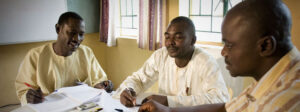Trauma Healing – Strength from Weakness
While this blog departs a little from the normal EMDC topics it has been dealt with in the past. An Introduction to Healing the Wounds… Read More »Trauma Healing – Strength from Weakness
While this blog departs a little from the normal EMDC topics it has been dealt with in the past. An Introduction to Healing the Wounds… Read More »Trauma Healing – Strength from Weakness
Global Missional AI Summit The Global Missional AI Summit brings together mission-minded workers, Bible translators, and technology practitioners to explore the value artificial intelligence (AI)… Read More »Global Missional AI Summit
Join us at the Storytelling Café at EMDC Online! I recently went to the massage therapist because my neck was hurting and all I had on my mind… Read More »Bible Storytelling Cafe.
In a survey done by Barna Research, it showed that 51% of the U.S. churchgoers do not know the Great Commission and 63% could not even correctly identify Matthew 28:18-20 as the Great Commission when given 5 verses to choose from. Media and social media have played a major role in desimination of information whether true or false, and have lead to response and action among people. Are we creating enough digital awareness through videos and on social media about the needs of the Unreached People Groups?
